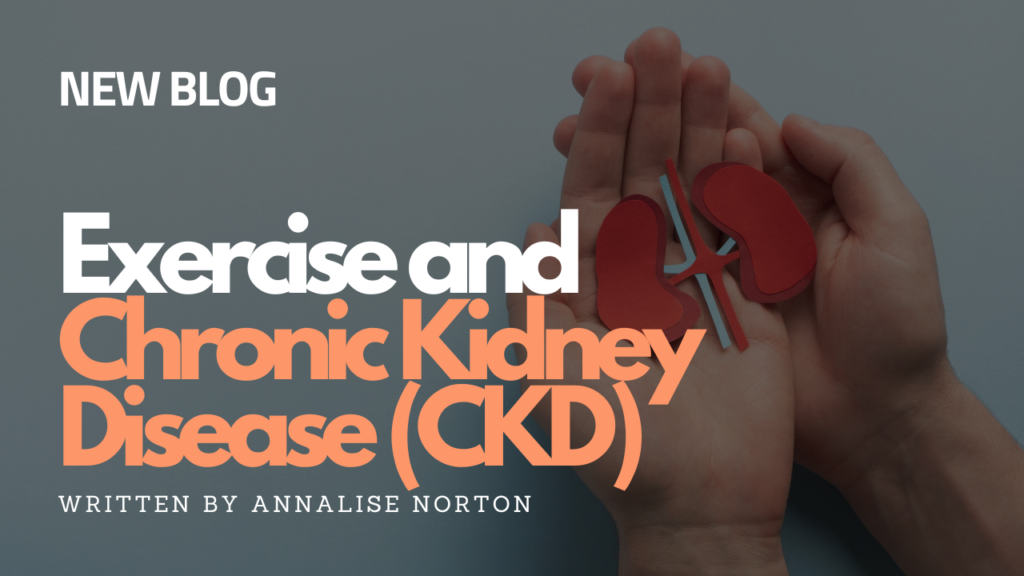March 13th is World Kidney Day – a day dedicated to raising awareness about kidney health and its importance in maintaining overall well-being. Chronic Kidney Disease (CKD) affects millions of people worldwide and can significantly impact their quality of life. One of the most effective, yet often overlooked, interventions for managing CKD is exercise. Let’s explore how exercise plays a pivotal role in managing CKD and why it should be an essential part of care.
Understanding Chronic Kidney Disease
Chronic Kidney Disease is a long-term condition where the kidneys gradually lose their function. This can lead to a buildup of waste products and excess fluid in the body, which can cause serious health problems like heart disease, high blood pressure, and electrolyte imbalances. CKD is often progressive, and its severity is typically measured in stages, from mild (stage 1) to kidney failure (stage 5), requiring dialysis or a kidney transplant.
According to the World Kidney Day campaign, early detection and prevention are crucial in reducing the global burden of kidney disease. For those already living with CKD, interventions to slow progression and improve quality of life are key. Among these interventions, regular physical activity has been shown to provide numerous benefits.

Exercise: A Powerful Tool in Managing CKD
Physical activity has a profound impact on CKD patients. Multiple studies, including one published in BMC Nephrology, highlight the positive effects of exercise on kidney function and overall health in those with CKD. Exercise can help:
- Improve Cardiovascular Health: CKD often leads to an increased risk of cardiovascular disease. Regular exercise helps improve heart function, reduce blood pressure, and enhance circulation, all of which are vital in managing CKD.
- Manage Blood Sugar and Weight: Type 2 diabetes is a major risk factor for CKD, and controlling blood sugar levels is crucial. Exercise plays a significant role in improving insulin sensitivity and helping maintain a healthy weight, which can reduce the risk of developing further complications from CKD.
- Enhance Kidney Function: While exercise cannot reverse kidney damage, studies indicate that it can help maintain or even improve kidney function in individuals with early to moderate-stage CKD. Aerobic exercises, such as walking, cycling, and swimming, have been shown to increase glomerular filtration rate (GFR), a key measure of kidney function.
- Reduce Fatigue and Improve Quality of Life: Fatigue is a common complaint among CKD patients, and it can significantly impact daily functioning. Research from the Journal of Renal Nutrition has shown that regular physical activity can help reduce fatigue, improve mood, and enhance overall well-being. This, in turn, boosts the quality of life and can help people with CKD remain active and engaged in their communities.
- Prevent Further Kidney Decline: Regular physical activity is associated with reduced inflammation and oxidative stress – two key contributors to the progression of CKD. Exercise helps regulate these factors, potentially slowing the progression of kidney disease and improving long-term outcomes.
Types of Exercise Beneficial for CKD Patients
Not all exercises are created equal when it comes to CKD. The type and intensity of exercise should be tailored to the individual’s stage of CKD, overall fitness level, and any co-existing health conditions. However, a few key types of exercise stand out for their effectiveness:
- Aerobic Exercise: Activities like walking, cycling, and swimming are great for improving cardiovascular health, lung capacity, and endurance. Aim for at least 150 minutes of moderate-intensity aerobic exercise each week, as recommended by health authorities.
- Resistance Training: Strengthening exercises, such as weightlifting or resistance band workouts, help improve muscle mass and strength, which can be compromised in CKD patients. Resistance training also aids in improving insulin sensitivity and controlling blood pressure.
- Flexibility and Balance Exercises: Stretching and balance exercises, such as yoga or tai chi, help maintain flexibility, reduce stress, and improve stability. These are particularly useful for CKD patients as they can help prevent falls and maintain mobility.
Safety Considerations for Exercise in CKD Patients
Although exercise is beneficial, safety should always be a priority for CKD patients. It’s important to:
- Consult with a healthcare provider before starting any exercise regimen, especially for those in advanced stages of CKD or with other chronic conditions.
- Start slowly and gradually increase intensity to avoid overexertion, as CKD patients may experience muscle weakness or joint pain.
- Monitor fluid intake carefully during exercise to prevent dehydration, which can strain the kidneys.
- Keep a watchful eye on blood pressure and heart rate, particularly for those with hypertension or heart disease, common comorbidities in CKD.
The Need for Education and Awareness
Despite the overwhelming evidence supporting exercise for CKD patients, many individuals are not aware of its benefits. The World Kidney Day 2025 campaign emphasizes the need for greater awareness and education about the importance of kidney health. By integrating exercise into CKD care plans, healthcare providers can empower patients to take charge of their health and improve their outcomes.
In addition to the physical benefits, exercise also fosters a sense of independence and accomplishment. It helps CKD patients maintain or regain their ability to perform daily tasks, improving their overall sense of well-being.
Conclusion: Exercise as Part of Kidney Care
On this World Kidney Day, let’s celebrate the power of exercise in managing chronic kidney disease. Whether you’re in the early stages or living with advanced CKD, incorporating physical activity into your routine can enhance kidney function, boost overall health, and improve your quality of life. By spreading awareness and promoting exercise, we can make a tangible difference in the lives of those living with CKD.
Written By Uplift EP, Annalise Norton
References:
Arazi, H., Mohabbat, M., Saidie, P., Falahati, A., & Suzuki, K. (2022). Effects of Different Types of Exercise on Kidney Diseases. Sports (Basel, Switzerland), 10(3), 42. Click here
Baker, L.A., March, D.S., Wilkinson, T.J. et al. Clinical practice guideline exercise and lifestyle in chronic kidney disease. BMC Nephrol 23, 75 (2022). Click here
Milam, R.H. Exercise Guidelines for Chronic Kidney Disease Patients. Journal of Renal Nutrition, Volume 26, Issue 4, e23 – e25 (2016). Click here


